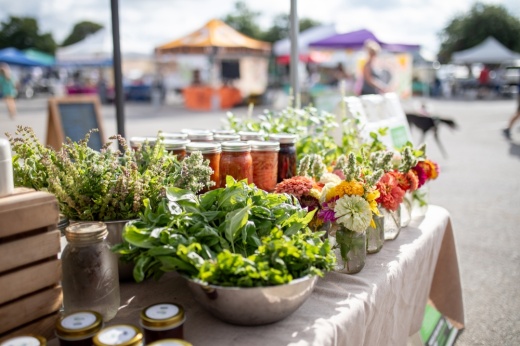“[Vendors] had an opportunity, to a certain extent, to hit the reset button [during COVID-19], and when they did, they realized, '... Why not work for myself and control my destiny a little bit more?’" said Richie Romero, manager of Lone Star Farmers Market, now located in the parking lot of Garbo’s Lobster in North Austin. “I think COVID[-19], in a positive way, has introduced a lot more people to develop their product, and the farmers market has been a great opportunity for them to test it out.”
As farmers markets continue to pop up around North Austin, residents are no longer having to drive to other parts of the metro to keep their dollars local.
The big picture
When Texas Farmers’ Market first opened in Cedar Park in 2010, one of the only other farmers markets was located in downtown Austin, said Liz Shafer, TFM at Lakeline’s director of operations.
“There was nothing north of Austin,” Shafer said. “ ... We had about 20 vendors who started with us at that farmers market, but it quickly became apparent that we had outgrown that space.”
TFM moved from its Cedar Park location to Lakeline Mall in the summer of 2010, providing Northwest Austin residents with a closer option.
Now, four other markets have since moved to or opened in the Northwest Austin area in under a year: Lone Star Farmers Market; The Domain Farmers Market; Gateway Market Days; and Arboretum Food and Artisan Market.
“At the time, there weren’t any other markets around [MoPac and Parmer Lane],” Romero said of relocating from Bee Cave in 2023. “I felt like we were filling a void that existed in that area.”
A closer look
Emylee Boone, CEO of The Domain Farmers Market, said her team identified a desire for a farmers market through research with local North Austin residents and businesses, adding that the challenges some vendors face when attempting to enter an existing market was a motivation.
“Many reputable markets have waiting lists extending over two years, which showed a need for a new opportunity for both established farmers and new business owners,” Boone said.
Along with community interest, the residential and development growth in North Austin was a major influence for market managers such as Romero with Lone Star Farmers Market.
“It’s been a huge positive not only for people that live in that area, but also as a destination market for people that are coming to visit,” Romero said.
For Gateway Market Days owner Selima Harbison, a North Austin native who has been a farmer for 10 years, the decision was a personal one.
“You’re not going to have farms in Austin. You’re going to have to get farms around the outskirts of Austin, like Georgetown, Marble Falls. ... You have to make it worth [farmers’] while to drive in, and treat them right,” Harbison said. “I do this so I can keep Texas farming and ranching alive because we almost lost it a couple years ago.”
Dig deeper
The demand for local and sustainable food is growing, said Stephanie Scherzer, owner of Austin-based online farmers market Farmhouse Delivery, which sources and delivers local produce, meat and more.
"People are interested in what’s growing in Central Texas and are opting for more seasonally focused eating,” Scherzer said.
Several markets around Austin, including TFM at Lakeline, also accept Supplemental Nutrition Assistance Program benefits, which Shafer said gives more residents access to what these markets have to offer.
“The pandemic [and] the storm in February 2021 taught us that the supply chain can easily be broken, so we need to figure out a way to kind of keep ourselves self-sufficient,” Shafer said. “Not to say that we as a farmers market are the solution to this unsatisfactory food system, but we’re at least a step in the right direction.”
What they're saying
“It’s easy to walk into a store; it’s stationary; it has everything you need. But when you come and shop local, you’re actually impacting your neighbors’ lives, and that’s important to all of us, because we do work hard providing these products.” Tanya Ramirez, owner of Tipsy Dipsy Dyes, Gateway Market Days
“You’re supporting a local, blue collar worker that’s doing this to support their family, whether they own the business or they’re working for the farmer. ... The labor of love, the blood and sweat that comes into making all this stuff—that all holds value.” William Parsons, owner of Clingy Peach, vendor at multiple markets
Looking ahead
Gateway Market Days, which opened Feb. 4, and Arboretum Food and Artisan Market, which opened Feb. 24, are the region’s two newest markets. As the spring and summer seasons approach and these markets find their footing, market owners such as Harbison are expecting to expand their offerings.
"It’s kind of a different intention and a different foundation that our market is built on,” Harbison said. “Our market is built on Texas farming and ranching; that’s the roots of it.”
Others in the farmers market scene are pushing for more regular markets.
“I hope to see a shift towards the seven-day market model ... year-round, everyday markets that support both the farmer and the community,” Scherzer said.





